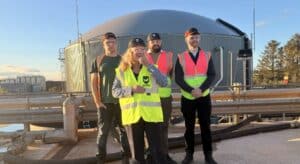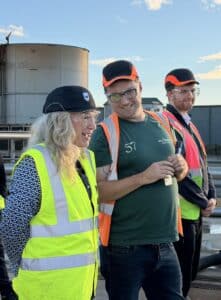Edinburgh green gas conference to highlight the sector’s economic and net zero value ahead of…
Scotland’s Cabinet Secretary Gillian Martin visits BrewDog’s anaerobic digestion plant
Scotland’s Cabinet Secretary Gillian Martin visits BrewDog’s anaerobic digestion plant
Ellon plant showcases Scotland’s leadership in green energy and circular economy innovation
On 22nd October, Scotland’s Cabinet Secretary for Climate Action and Energy, Gillian Martin MSP, visited BrewDog’s state-of-the-art anaerobic digestion (AD) and biomethane facility in Ellon. There she could see first-hand how the Scottish AD industry is turning its outputs into renewable energy and cutting carbon emissions.
The site, developed as part of BrewDog’s net zero strategy, converts organic waste and by-products from brewing into green gas, thus helping decarbonise operations and support Scotland’s transition to a circular, low-carbon economy. The plant offers a perfect illustration how AD can deliver energy security, rural investment, and carbon savings in line with Scotland’s ambitious climate goals .

The visit was organised by the Anaerobic Digestion and Bioresources Association (ADBA), and highlighted the sector’s potential to help Scotland meet its net zero targets through increased deployment of AD and biomethane technologies in the country.
Dr Gareth Mottram, ADBA’s Senior Policy Lead, said: “Scotland has a unique opportunity to lead the UK in deploying anaerobic digestion and biomethane as core tools for achieving net zero. BrewDog’s Ellon plant is a perfect example of how food and drink businesses can capture value from waste, cut emissions, and generate clean energy for their operations and local communities. We welcome the Cabinet Secretary’s engagement and look forward to working with the Scottish Government to unlock the full potential of AD across the economy.”
 James Taylor, BrewDog CEO, commented: “It was fantastic to welcome Cabinet Secretary Gillian Martin to our site in Ellon. We’re incredibly proud of our Anaerobic Digestion Plant and the role it plays in our journey to Net Zero. It’s a great example of how innovation and sustainability can go hand in hand – treating over 60% of our brewery wastewater and generating biogas which can be upgraded and injected into the local gas network whilst helping us reduce our carbon footprint. We’re committed to continuing to push boundaries in sustainable brewing and it was great to share that progress on site.”
James Taylor, BrewDog CEO, commented: “It was fantastic to welcome Cabinet Secretary Gillian Martin to our site in Ellon. We’re incredibly proud of our Anaerobic Digestion Plant and the role it plays in our journey to Net Zero. It’s a great example of how innovation and sustainability can go hand in hand – treating over 60% of our brewery wastewater and generating biogas which can be upgraded and injected into the local gas network whilst helping us reduce our carbon footprint. We’re committed to continuing to push boundaries in sustainable brewing and it was great to share that progress on site.”
– ENDS –
For further information, contact:
Jocelyne Bia, Head of Corporate Communications, PR and Brand Management
e: jocelyne.bia@adbioresources.org; tel: 020 3176 0592
Notes to editors
- The Anaerobic Digestion and Bioresources Association (ADBA) is the trade association for the UK anaerobic digestion (AD) and biogas industry. ADBA’s vision is to see the full potential of the UK AD industry realised so it can help the UK achieve its emissions targets and other policy goals, creating a truly circular economy. www.adbioresources.org
- About the UK AD industry
- There are currently over 750 AD plants operational in the UK
- The entire industry digests approximately 36 million tonnes of organic material each year – organic material that would otherwise emit greenhouse gases including highly potent methane, if left untreated in landfill.
- An estimated 21 TWh of biogas is produced each year by the AD industry – this green gas is either used to generate electricity and heat via a combined heat and power (CHP) unit or upgraded to biomethane and injected directly into the national gas grid.
- The industry currently delivers savings of 1% off the UK’s greenhouse gas emissions every year.
- An estimated 4,800 people are currently employed in the AD and biogas industry in the UK.
- Overall the industry grew by 5 per cent last year as the closure of older, smaller plants was outweighed by big-scale units feeding into the gas grid.
- Fully deployed, by 2050, the UK AD and biogas industry is expected to:
-
-
- Produce over 100TWh of biomethane
- Provide between 20% and 50% of UK gas demand
- create 30,000 direct and 30,000 indirect jobs.
- save the UK 27 million tonnes of CO2 equivalent = taking 1/3rd of all cars off the road
- heat 6.8 million UK homes with the 8 billion m3 of biomethane generated
-
- How AD works
Anaerobic digestion (AD) is the natural breakdown of organic matter when deprived of oxygen in a container called digester. The process produces biogas and a residue called digestate, which can be used as a biofertiliser. The graphic below shows the applications of biogas and digestate and circularity of the AD process.
